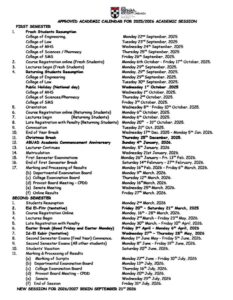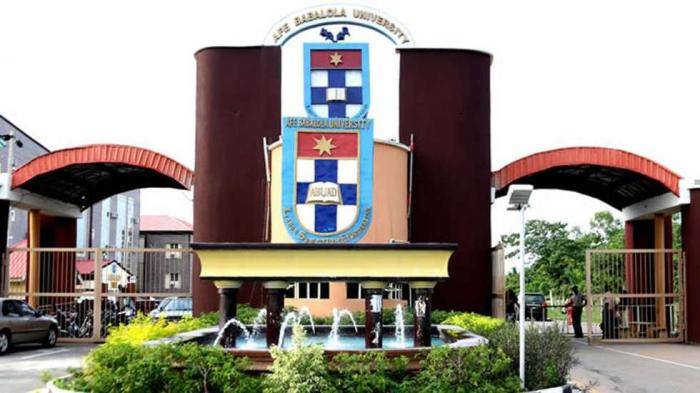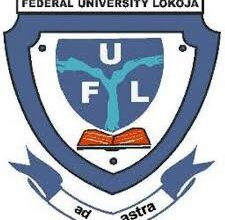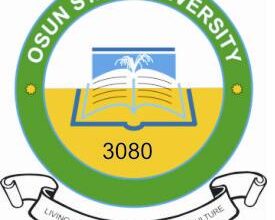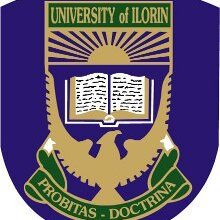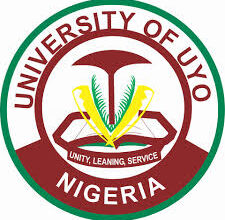Every academic year, Afe Babalola University, Ado-Ekiti (ABUAD) releases a detailed schedule to guide students and staff.
The 2025/2026 calendar outlines when new and returning students resume, the registration periods, examinations, breaks, and other major campus activities.
Below is a full explanation of the timetable, arranged semester by semester with helpful notes on how to stay organized.
First Semester
The first semester is the longest stretch of the academic year and covers everything from the arrival of freshers to the first round of examinations.
1. Fresh Students’ Resumption (22–26 September 2025)
ABUAD staggers arrival dates by college to avoid congestion:
-
College of Engineering – Monday 22 September
-
College of Law – Tuesday 23 September
-
College of Medicine & Health Sciences (MHS) – Wednesday 24 September
-
College of Sciences/Pharmacy – Thursday 25 September
-
College of Social & Management Sciences (SMS) – Friday 26 September
New students use these days to settle into hostels, collect orientation materials, and begin the documentation process.
2. Course Registration (Freshers: 6–17 October 2025)
Online registration for courses begins Monday 6 October and runs for nearly two weeks.
Students are advised to meet their academic advisers early to avoid late registration penalties.
3. Lectures Begin (Freshers: 29 September 2025)
Interestingly, lectures start the week before formal online registration closes, so students must be ready for classes almost immediately after arrival.
4. Returning Students’ Resumption (29 September–3 October 2025)
Returning students also resume in phases:
-
Engineering and Law – Monday 29 September
-
Sciences/Pharmacy – Wednesday 1 October (a public holiday falls on this date)
-
MHS – Thursday 2 October
-
SMS – Friday 3 October
5. Course Registration for Returning Students (6–10 October 2025)
Returning students register during the first full week of October. Late registration attracts penalties from 20 to 31 October, so prompt action is essential.
6. Mid-Semester Activities and Breaks
-
End of Year Break: 17 December 2025 to 5 January 2026
-
Christmas Break: Thursday 25 December 2025
-
ABUAD Academic Commencement Anniversary: Sunday 4 January 2026
The break provides time for students to travel home and recharge for the second half of the semester.
7. Resumption of Lectures (5 January 2026)
Classes pick up immediately after the New Year celebrations.
8. Matriculation (21 January 2026)
This is the official induction ceremony for fresh students, marking their formal admission into the ABUAD community.
9. First Semester Examinations (26 January – 13 February 2026)
Exams are spread over three weeks. Students must meet the mandatory attendance requirement to be eligible.
10. End of First Semester Break (14–27 February 2026)
After exams, students enjoy two weeks of rest while results are processed.
11. Marking and Processing of Results
-
Departmental Board – 9 March 2026
-
College Examination Board – 12 March 2026
-
Provost Board Meeting (CPDD) – 16 March 2026
-
Senate Meeting – 25 March 2026
-
Online Release of Results – 27 March 2026
These dates ensure that grades are carefully checked and published before the second semester begins.
Second Semester
The second half of the academic year is slightly shorter but equally busy.
1. Resumption (Monday 2 March 2026)
Students return for the new semester right after results are released.
2. Course Registration (2–28 March 2026)
Registration spans most of March, giving students time to finalize their course load.
3. Lectures Begin (2 March – 23 May 2026)
Teaching covers roughly twelve weeks, including a brief Easter recess.
4. Late Registration with Penalty (6–10 April 2026)
Students who miss the regular registration period can still register, but must pay a penalty.
5. Breaks and Public Holidays
-
Easter Break: Friday 3 – Monday 6 April 2026
-
Eid-el-Kabir (tentative): Wednesday 28 May 2026
These dates may shift slightly depending on national announcements, but ABUAD typically observes all federal public holidays.
6. Second Semester Examinations (Final Year): 1–5 June 2026
Final-year students sit for exams earlier to allow time for project defense, clearance, and convocation preparations.
7. General Examinations for Other Students (8–19 June 2026)
Non-finalists write their papers over a two-week period.
8. Students’ Vacation (from 27 June 2026)
Once exams end, undergraduates begin their long vacation, while lecturers and administrators move on to grading.
9. Marking and Processing of Results
-
Marking of Scripts – 22 June to 10 July 2026
-
Departmental Board – 13 July 2026
-
College Examination Board – 16 July 2026
-
Provost Board Meeting (CPDD) – 20 July 2026
-
Senate Meeting – 29 July 2026
-
End of Session – Friday 31 July 2026
This careful sequence ensures that grades are scrutinized at multiple levels for accuracy.
Transition to the Next Academic Year
ABUAD has already scheduled the start of the 2026/2027 session for Monday 21 September 2026.
This forward planning gives students and parents ample time to prepare financially and logistically for the following year.
Practical Tips for Students and Parents
-
Mark Your Calendar Early
Add every important date—especially registration windows and exam periods—to a planner or digital calendar to avoid late penalties. -
Plan Travel Around Breaks
The end-of-year break (17 Dec – 5 Jan) and long vacation (from 27 June) are perfect times to travel or arrange internships. -
Meet Attendance Requirements
ABUAD enforces strict attendance policies. Missing classes can disqualify students from writing exams even if they are academically prepared. -
Financial Preparation
Course registration and late penalty dates are fixed. Parents should plan fee payments ahead of time to avoid delays. -
Health and Well-Being
Semester breaks are opportunities to rest and manage stress. Students should use them to maintain good physical and mental health.
Final Thoughts
The 2025/2026 ABUAD academic calendar is both detailed and thoughtfully arranged.
It balances intensive learning periods with adequate breaks, ensures timely release of results, and provides clear guidance for every stakeholder.
By following this schedule closely, students can stay on track academically, avoid unnecessary penalties, and make the most of their university experience.
